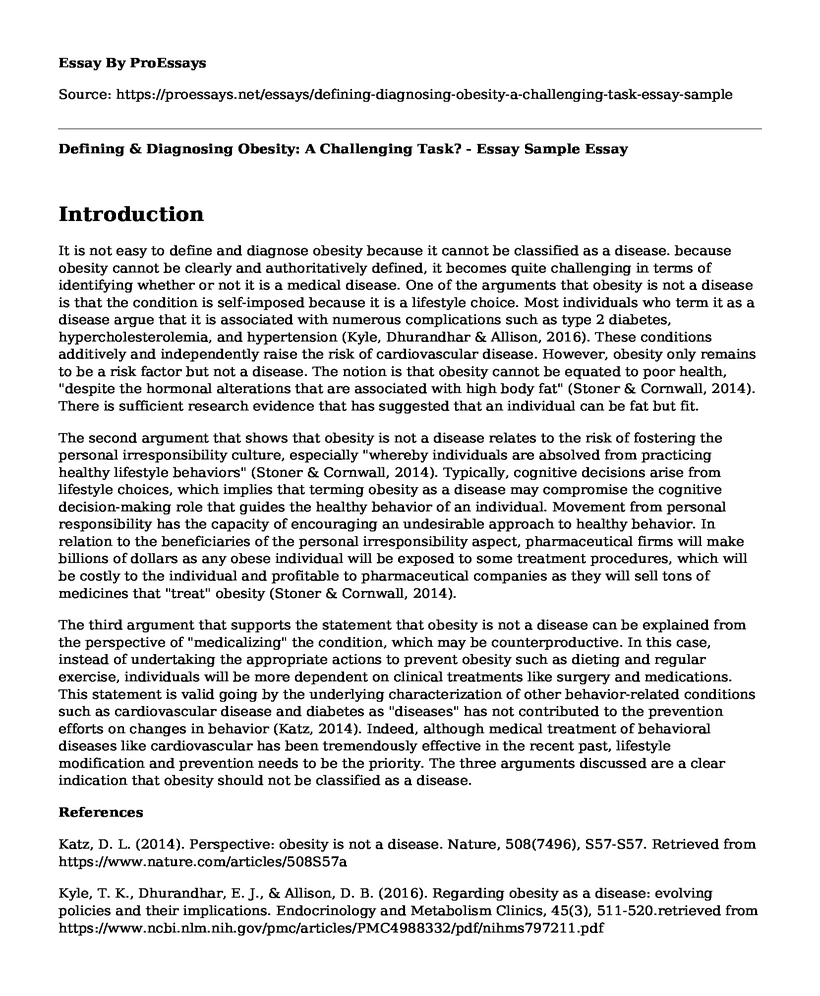Introduction
It is not easy to define and diagnose obesity because it cannot be classified as a disease. because obesity cannot be clearly and authoritatively defined, it becomes quite challenging in terms of identifying whether or not it is a medical disease. One of the arguments that obesity is not a disease is that the condition is self-imposed because it is a lifestyle choice. Most individuals who term it as a disease argue that it is associated with numerous complications such as type 2 diabetes, hypercholesterolemia, and hypertension (Kyle, Dhurandhar & Allison, 2016). These conditions additively and independently raise the risk of cardiovascular disease. However, obesity only remains to be a risk factor but not a disease. The notion is that obesity cannot be equated to poor health, "despite the hormonal alterations that are associated with high body fat" (Stoner & Cornwall, 2014). There is sufficient research evidence that has suggested that an individual can be fat but fit.
The second argument that shows that obesity is not a disease relates to the risk of fostering the personal irresponsibility culture, especially "whereby individuals are absolved from practicing healthy lifestyle behaviors" (Stoner & Cornwall, 2014). Typically, cognitive decisions arise from lifestyle choices, which implies that terming obesity as a disease may compromise the cognitive decision-making role that guides the healthy behavior of an individual. Movement from personal responsibility has the capacity of encouraging an undesirable approach to healthy behavior. In relation to the beneficiaries of the personal irresponsibility aspect, pharmaceutical firms will make billions of dollars as any obese individual will be exposed to some treatment procedures, which will be costly to the individual and profitable to pharmaceutical companies as they will sell tons of medicines that "treat" obesity (Stoner & Cornwall, 2014).
The third argument that supports the statement that obesity is not a disease can be explained from the perspective of "medicalizing" the condition, which may be counterproductive. In this case, instead of undertaking the appropriate actions to prevent obesity such as dieting and regular exercise, individuals will be more dependent on clinical treatments like surgery and medications. This statement is valid going by the underlying characterization of other behavior-related conditions such as cardiovascular disease and diabetes as "diseases" has not contributed to the prevention efforts on changes in behavior (Katz, 2014). Indeed, although medical treatment of behavioral diseases like cardiovascular has been tremendously effective in the recent past, lifestyle modification and prevention needs to be the priority. The three arguments discussed are a clear indication that obesity should not be classified as a disease.
References
Katz, D. L. (2014). Perspective: obesity is not a disease. Nature, 508(7496), S57-S57. Retrieved from https://www.nature.com/articles/508S57a
Kyle, T. K., Dhurandhar, E. J., & Allison, D. B. (2016). Regarding obesity as a disease: evolving policies and their implications. Endocrinology and Metabolism Clinics, 45(3), 511-520.retrieved from https://www.ncbi.nlm.nih.gov/pmc/articles/PMC4988332/pdf/nihms797211.pdf
Stoner, L., & Cornwall, J. (2014). Did the American Medical Association make the correct decision classifying obesity as a disease?.The Australasian medical journal, 7(11), 462. Retrieved from https://www.ncbi.nlm.nih.gov/pmc/articles/PMC4259211/pdf/AMJ-07-462.pdf
Cite this page
Defining & Diagnosing Obesity: A Challenging Task? - Essay Sample. (2023, Apr 14). Retrieved from https://proessays.net/essays/defining-diagnosing-obesity-a-challenging-task-essay-sample
If you are the original author of this essay and no longer wish to have it published on the ProEssays website, please click below to request its removal:
- Essay Sample on Coaching International Workers Who Experience Burnout and Stress Problems
- Essay Sample on Rural Bhutan: Quality Medical School & Hospital Benefits Local People
- Paper Example on Managing Obesity in Houston, TX: Possible Measures
- Essay on Community-Based Nursing: A Catalyst for Quality Care and Improved Outcomes
- Essay Sample on Protecting Health Data: The HIPAA Policy
- Essay Example on Sleep Studies in Lab Setting: Problems & Solutions
- New Motherhood: Birth of My First Child - Free Report Example







